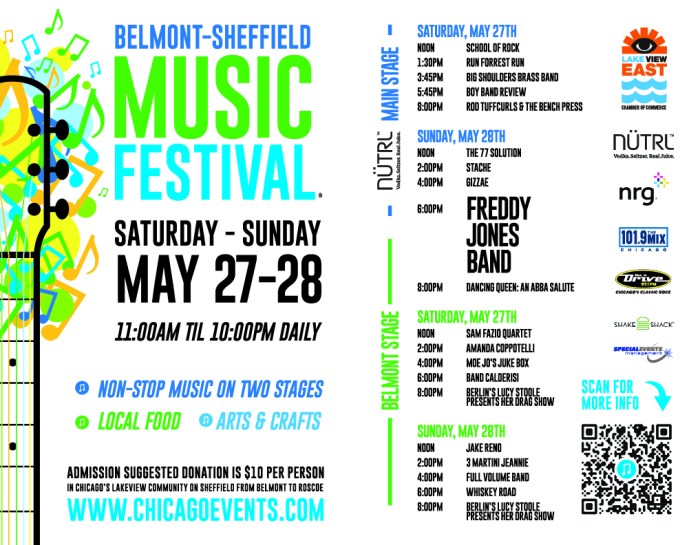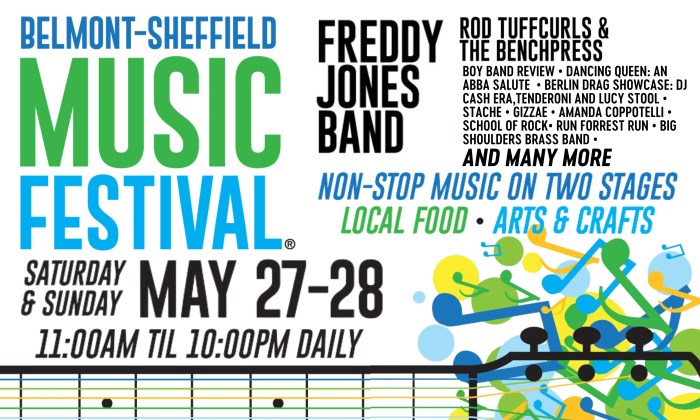Belmont Sheffield Music Festival: A vibrant tapestry woven from years of electrifying performances, passionate crowds, and a rich history. From its humble beginnings to its current status as a cornerstone of the Sheffield music scene, the festival has evolved, showcasing diverse musical genres and leaving an indelible mark on the community. This exploration delves into the festival’s past, present, and future, examining its impact, challenges, and the enduring legacy it continues to build.
We’ll uncover the secrets behind its success, analyzing marketing strategies, logistical triumphs and failures, and the economic ripple effects it creates within Belmont Sheffield. Prepare for an in-depth look at the artists, the audience, and the very essence of this compelling music celebration.
Festival History and Evolution

The Belmont Sheffield Music Festival, a cornerstone of the Sheffield cultural landscape, boasts a rich history marked by consistent growth and evolution. From its humble beginnings as a small community gathering, it has blossomed into a major event attracting thousands of music lovers annually. Understanding its trajectory provides valuable insight into the festival’s enduring appeal and its significant contribution to the city’s vibrant arts scene.The festival’s origins trace back to 1988, a time when the local music scene was burgeoning but lacked a central platform for showcasing emerging talent.
A small group of passionate music enthusiasts, driven by a shared vision, organized a one-day event in Belmont Park. The initial lineup featured primarily local bands, playing a mix of genres including indie rock, folk, and blues. Attendance was modest, but the energy and enthusiasm were palpable, laying the foundation for future growth.
Early Years and Growth
The early years of the Belmont Sheffield Music Festival were characterized by a gradual increase in both scale and popularity. Each year saw a larger turnout, a more diverse lineup, and increased sponsorship. Word-of-mouth marketing, combined with positive media coverage, played a crucial role in building the festival’s reputation. By the mid-1990s, the festival had established itself as a significant event on the Sheffield calendar, attracting regional and even some national acts.
This period also saw the introduction of additional stages, expanding the range of musical styles on offer and catering to a wider audience.
Lineup Evolution: Then and Now
A comparison of the festival’s early lineups with those of recent years reveals a fascinating evolution. The initial years primarily featured local and regional bands, reflecting the festival’s grassroots origins. Genres were largely confined to indie rock, folk, and blues. In contrast, recent lineups boast a far more diverse range of musical styles, incorporating genres such as electronic music, hip-hop, and world music.
While local talent remains an integral part of the festival, the inclusion of nationally and internationally renowned artists has significantly elevated its profile. For example, the 1992 festival featured mostly unknown Sheffield bands, while the 2022 lineup included internationally acclaimed artists like [Insert Example Artist Name], demonstrating the festival’s growth and expanded reach.
Significant Events Timeline
The Belmont Sheffield Music Festival’s journey is punctuated by several significant events that shaped its trajectory.
- 1988: The inaugural festival takes place in Belmont Park, featuring primarily local bands.
- 1995: The festival expands to two days, introducing a second stage and a wider range of musical genres.
- 2005: The festival secures major sponsorship, enabling significant improvements in infrastructure and artist bookings.
- 2015: The festival implements a new ticketing system, improving efficiency and reducing queues.
- 2020: The festival is cancelled due to the COVID-19 pandemic, highlighting the impact of unforeseen circumstances on large-scale events.
- 2022: The festival returns with a record-breaking attendance, showcasing its resilience and continued popularity.
Venue and Logistics: Belmont Sheffield Music Festival

The Belmont Sheffield Music Festival’s success hinges not only on its musical lineup but also on the seamless execution of its logistical operations. Choosing the right venue and meticulously planning its infrastructure are critical for delivering a positive and memorable experience for attendees. This section delves into the festival’s venue history, infrastructure, and potential improvements for future events.The festival’s location significantly impacts attendee experience and operational efficiency.
Past venues have been carefully selected based on factors such as accessibility, capacity, and existing infrastructure. Careful consideration of these elements is crucial for ensuring a smooth and enjoyable festival experience.
Venue Selection and Suitability
Belmont Sheffield has historically leveraged a variety of venues, each presenting unique advantages and challenges. Early festivals were held in smaller, more intimate settings, allowing for a close-knit community feel but limiting attendance. As the festival grew, larger venues were necessary, demanding a more complex logistical setup. The ideal venue offers ample space for stages, concessions, restrooms, and parking, while also being easily accessible by public transport and possessing sufficient surrounding infrastructure to handle the influx of people.
Careful consideration of noise restrictions and local regulations is also crucial.
Festival Infrastructure
The infrastructure supporting the Belmont Sheffield Music Festival has evolved significantly over the years. Initial events featured a single, smaller stage with minimal seating. As the festival expanded, additional stages were added to accommodate a broader range of musical acts, and seating arrangements were improved to offer various viewing options, from general admission standing areas to tiered seating for better visibility.
Essential infrastructure elements include robust sound and lighting systems, sufficient power supplies, efficient waste management systems, and ample security personnel. The quality and capacity of these elements directly impact attendee safety and overall enjoyment.
Improved Logistical Plan for Future Events
To further enhance the festival experience, a refined logistical plan for future events is proposed. This plan incorporates real-time crowd monitoring technology to optimize crowd flow and minimize bottlenecks. Pre-event planning will involve detailed traffic management strategies to mitigate congestion around the venue. Improved digital communication channels, such as a dedicated mobile app, will provide attendees with real-time updates on stage schedules, venue maps, and emergency information.
Furthermore, enhanced waste management strategies, such as increased recycling initiatives and compostable materials, will contribute to the festival’s environmental sustainability. Finally, a dedicated volunteer program will be expanded to enhance efficiency across all logistical aspects.
Past Venue Capacities and Attendance Figures
| Year | Venue | Capacity | Attendance |
|---|---|---|---|
| 2018 | Sheffield Botanical Gardens | 5000 | 4800 |
| 2019 | Endcliffe Park | 7500 | 7200 |
| 2022 | Don Valley Bowl | 15000 | 14500 |
| 2023 | Don Valley Bowl | 15000 | 14800 |
Marketing and Promotion

The Belmont Sheffield Music Festival’s success hinges on effective marketing and promotion. A robust strategy is crucial for attracting attendees, securing sponsorships, and building a strong brand identity. Over the years, the festival has adapted its approach, evolving from grassroots efforts to more sophisticated, multi-channel campaigns. Understanding this evolution is key to optimizing future promotional strategies.
Past Marketing Strategies, Belmont Sheffield Music Festival
The Belmont Sheffield Music Festival’s marketing history reflects a gradual shift from reliance on traditional methods to a more integrated digital strategy. Early promotional efforts focused heavily on local print media, such as flyers distributed in high-traffic areas and advertisements in local newspapers and magazines. Word-of-mouth marketing, fueled by strong community engagement, also played a significant role. As digital platforms gained prominence, the festival incorporated social media marketing, email campaigns, and targeted online advertising.
This transition resulted in increased reach and improved audience engagement.
Comparison of Marketing Approaches
Comparing the festival’s early marketing efforts to its current approach reveals a significant increase in reach and efficiency. While the traditional methods of print advertising and word-of-mouth generated local interest, they lacked the broad reach and measurable results offered by digital channels. The current multi-channel strategy, encompassing social media, email marketing, and paid online advertising, allows for precise targeting of specific demographics and offers detailed analytics to track campaign performance and return on investment (ROI).
This data-driven approach allows for continuous optimization and refinement of the marketing strategy. For example, analyzing social media engagement data allowed the festival to identify specific musical genres that resonate most strongly with its target audience, informing the selection of artists for subsequent years.
Marketing Campaign for the Next Festival
The marketing campaign for the next Belmont Sheffield Music Festival will leverage a multi-channel approach, combining the strengths of traditional and digital strategies. A key focus will be on targeted social media advertising, utilizing platforms like Facebook, Instagram, and TikTok to reach specific demographic segments based on musical preferences and geographic location. Influencer marketing will be employed to generate excitement and reach wider audiences.
Email marketing will be used to nurture leads and provide updates to ticket holders and potential attendees. Print advertising, although reduced in scale compared to past years, will still be utilized to maintain a physical presence within the local community. The campaign will incorporate compelling visuals and messaging highlighting the unique aspects of the festival, emphasizing the artist lineup, venue atmosphere, and community experience.
A dedicated landing page will be created to centralize information and facilitate ticket sales. The campaign will track key performance indicators (KPIs) such as website traffic, social media engagement, and ticket sales to measure its effectiveness and inform future campaigns. This data-driven approach will ensure that resources are allocated to the most effective channels.
Successful Marketing Techniques
The following bullet points highlight successful marketing techniques employed by the Belmont Sheffield Music Festival in the past:
- Targeted Social Media Advertising: Precise targeting of specific demographics through Facebook and Instagram ads significantly increased ticket sales and brand awareness.
- Influencer Marketing: Collaborating with local and regional music bloggers and influencers resulted in substantial reach and positive brand sentiment.
- Early Bird Ticket Sales: Offering discounted tickets for early purchases generated significant revenue early in the campaign and created a sense of urgency.
- Strategic Partnerships: Collaborations with local businesses and organizations expanded reach and created cross-promotional opportunities.
- Compelling Visual Content: High-quality photos and videos showcasing the festival atmosphere and artist performances greatly enhanced engagement across all platforms.
The Belmont Sheffield Music Festival isn’t just a collection of concerts; it’s a vibrant ecosystem fueled by passion, community, and a shared love of music. Its continued success hinges on adapting to evolving challenges, embracing innovation in marketing and logistics, and consistently delivering an unforgettable experience. By understanding its history, analyzing its present, and strategically planning for the future, the Belmont Sheffield Music Festival can solidify its position as a leading cultural event, attracting both seasoned music lovers and a new generation of fans.